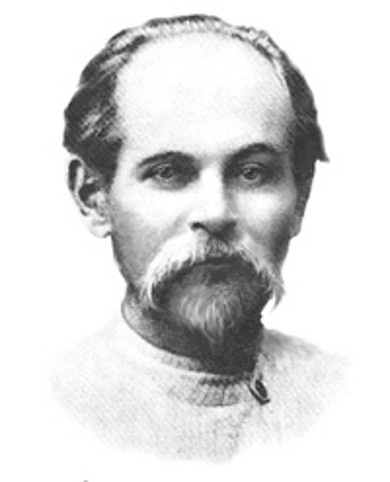In celebration of all Fathers, Grandfathers, Godfathers, Uncles, and Father figures, we wish you a day filled with love, family, and music. As we celebrate Father’s Day, we ask that you remember and pray for all the men who have left their families to fight for the freedom of Ukraine.
The Ukrainian Art Song Project sends you this gift of song…♪
The Ukrainian Art Song Project invites you to listen to a beautiful interpretation of
Blossoms in the Valley ~ Зацвіла в долині
Yakiv Sepovy: Composer
Taras Shevchenko: Poet
Performers:
Pavlo Hunka: Bass-baritone
Albert Krywolt: Piano
Taras Shevchenko
Translation: Watson Kirkconnell
There blossomed in a valley long ago
A red cranberry bush, as innocent
As if a maiden smiled in her delight.
A bird was gladdened and began to chirp...
A maiden heard it and in smock of white
Came from her whitewashed cottage to have joy,
There in the forest in the valley low.
Out of the green grove there emerged to meet her
A fine young Cossack: and he greets the maiden,
He kisses her and holds her gentle hands.
Along the valley then they softly walk
And, like two children, sing in simple pleasure;
To that cranberry bush they come at last,
And there sit down... and kiss, and kiss, and kiss...
What better Heaven shall we ask from God?
Stepovy ended his creative hiatus during WWI with a return to the poetry of Shevchenko. Peace and quiet, a romantic evening, lovers kissing... What more could one want? Shevchenko’s moral discussion regarding the merits of earthly versus heavenly paradise is omitted. Listen for the cuckoo in bar 9 of the accompaniment, and the kiss in bar 25
Тарас Шевченко
Зацвіла в долині
Червона калина,
Ніби засміялась
Дівчина-дитина.
Любо, любо стало,
Пташечка зраділа
І защебетала.
Почула дівчина
І в білій свитині,
З біленької хати
Вийшла погуляти
У гай на долину.
І вийшов до неї
З зеленого гаю
Козак молоденький;
Цілує, вітає,
І йдуть по долині,
І йдучи співають.
Як діточок двоє,
Під тую калину
Прийшли, посідали
І поцілувались.
Якого ж ми раю
У Бога благаєм?
Після творчої перерви, спричиненої Першою сві-товою війною, Степовий повертається до поезії Шевченка. Тиша і спокій, романтичний вечір, закохані цілуються... Що ще можна хотіти? Композитор оминає Шевченкову лекцію про моральну перевагу земного чи небесного раю. Слідкуйте за зозулею у 9-мутакті супроводу і за поцілунком у 25-му.
YAKIV STEPOVYI (1883 - 1921)
From Imperial choirboy to Soviet composer, much of the life story of Yakiv Stepovyi is lost in the historic upheavals that ravaged Ukraine in the 20th century. Even so, Stepovyi’s legacy of art songs, piano pieces, and other vocal works survives almost intact. It reveals a composer who could adapt to changes in politics, culture, and society. His eclectic preludes and other ephemeral piano pieces give way, after WWI, to revolutionary mass songs and arrangements for bandura, a lute-like Ukrainian folk instrument. But there was one constant in Stepovyi’s life: the art song. Each one is an uncompromising declaration of the composer’s artistic ideal. Stepovyi was one of the first modern Ukrainian composers to avoid the direct use of folk material. He sought to transform the traditional language of music into a new modernist idiom and thus create a new national identity.
Yakiv Yakymenko (pseudonym Stepovyi) was born in the city of Kharkiv, in north-eastern Ukraine, then part of the Russian Empire. His father was a poor, retired non-commissioned officer. In 1886, Yakiv’s older brother, composer Fedir Yakymenko (aka Theodore Akimenko), was sent to the Imperial Chapel as a choirboy. Nine years later, Yakiv joined him there in St. Petersburg. Within three years, Yakiv's voice broke and he was forced to leave the choir. Somehow he managed to continue his music studies. A year later, in 1899, he composed the liturgical Cherubic Hymn, opus 1. Then, in 1902, Fedir arranged an interview for his younger brother with Alexander Glazunov and Nikolai Rimsky-Korsakov. Both Russian composers were so impressed with Yakiv’s talent that they allowed him to study part-time for free at the St. Petersburg Conservatory. The studies lasted for twelve years, until 1914, when Stepovyi finally graduated.
Meanwhile, Stepovyi began to compose art songs and small piano pieces. The first two sets of art songs Barvinky (Periwinkles, 1905–1907), opus 3–4, were published by Idzikowski in Kyiv under his pseudonym. Mykola Lysenko, the father of Ukrainian musical nationalism, reviewed the first nine and found Stepovyi’s music lacking in traditional folk idioms. However, Kyrylo Stetsenko, a fellow composer, praised Stepovyi, especially his song ‘Zymoiu’ (In Winter) on a text by the as-yet unpublished Oleksander Oles. Encouraged, Stepovyi composed the song cycle Nastroї (Moods, 1907–1908), opus 6, based entirely on the poetry of Oles. Then, in 1911, Stepovyi set to music three poems by the fifteenyear- old Maksym Rylsky, the opus 8 song cycle. Both Oles and Rylsky would become giants of 20th-century Ukrainian literature. Nevertheless, Olena Pchilka, editor of Ridnyi (Native Land) and mother of the poet Lesia Ukrainka, refused to publish the Rylsky song cycle in its entirety because it was too modern, too far removed from the folk idiom and, therefore, un-nationalistic. Stepovyi found a more worldly audience in St. Petersburg and Moscow. As early as 1904 he had met a fellow Kharkivite in the northern capital, the renowned opera singer Ivan Alchevsky. They became lifelong friends and supporters of each other’s endeavours. Alchevsky often performed the composer’s songs, and Stepovyi likely wrote some especially for him. It is surmised that it was the Alchevsky family that introduced Stepovyi to the poetry of Oles. After his father’s death in 1911, Stepovyi embarked on a series of journeys in Ukraine and Europe. In the summer of 1912 he visited Alchevsky in Paris, where the opera singer was engaged. Upon his return, he also tried his hand at music criticism, writing a number of articles for the Moscow journal Muzyka.
Stepovyi’s music career was interrupted at the beginning of WWI, when he was conscripted into the army as a secretary on a hospital train. It was only in 1917, when the Russian Revolution broke out, that Stepovyi was able to obtain a discharge. Immediately, he went to Kyiv to start teaching at the newly established Conservatory. There he resumed writing his art songs, which became more and more complex, formalistic.
During the last five years of his life, Stepovyi was caught up in the Ukrainian-Soviet War (1917–1921) and the creation of the new Socialist order. By siding with the Socialists, Stepovyi soon found himself in key bureaucratic positions. He became the music director of the Ukrainian State Theatre of Music and Drama, director of the Folk Conservatory, director of music education in the Ministry of Education, and organizer of the Ukrainian State Symphony Orchestra, the State String Quartet, and the “official” vocal ensemble that toured and performed in factories, refineries, and other industrial complexes. With the demand for proletarian music on the rise, Stepovyi found himself increasingly occupied with writing simple pedagogical pieces for children, working with ensembles of folk instruments, and arranging folk and revolutionary songs for amateur choirs.
Like all revolutions, the new Socialist order also consumed its children. Yakiv Stepovyi died of typhus at the beginning of the first man-made famine in Soviet Ukraine (1921–1923). Within the Soviet paradigm it was impossible to assess Stepovyi’s contribution to the genre of the art song.
The Ukrainian Art Song Project has been bringing Ukraine's musical treasures to light since 2004. With your support, we will continue to bring Ukraine's finest composers and their masterpieces to the world stage, where they belong.
Проєкт "Українськa Мистецькa Пісня" поширює найкращі зразки української музики з 2004 року. З Вашою підтримкою ми продовжимо презентувати найкращих українських композиторів та їх шедеври, які належать до світової музичної спадщини.
Your gift can also be made through CanadaHelps as a one-time or monthly donation.







